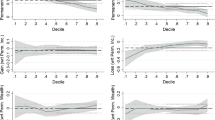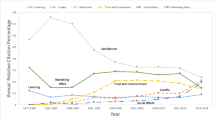Concluding comments
The interdependence of consumption over time unsettles many firmly held conclusions that concern the impact of government policies. Becker and Murphy's (1988) analysis of the complimentarity of consumption of a given good over time suggests that people will not always adjust marginally to changes in the parameters of consumption, one of which is surely the presence, absence, or prospects of excise taxation. Lee and Kreutzer's (1982) analysis of the lagged demand curve indicates that any threat to the stability of future property rights — through the imposition of excise taxes or anything else — can have what would be considered, viewed from the accepted paradigm, perverse consumption behavior. Excise taxes in many essential regards represent threats to current and future property rights. As a consequence, for goods whose consumption is interdependent over time, or addictive, excise taxes can retard consumption in both current and future time periods by more than might be thought from the perspective of the standard analytical models. Such a conclusion undermines conventional wisdom, which holds that excise taxes are often designed and applied to products with inelastic demands simply to minimize economic distortions.
Similar content being viewed by others
References
Becker, G.S. and Murphy, K.M. (1988). A theory of rational addiction. Journal of Political Economy 96 (August): 675–700.
Brennan, G. and Buchanan, J.M. (1980). The power to tax. Cambridge, MA: Cambridge University Press.
Gardner, W.D. (1978). Government finance: National, state, and local. Englewood Cliffs, NJ: Prentice-Hall.
Lee, D.R. and Kreutzer, D. (1982). Lagged demand and a ‘perverse’ response to threatened property rights. Economic Inquiry 20 (October): 79–588.
Musgrave, R.A. and Musgrave, P.B. (1973). Public finance in theory and practice. New York: McGraw-Hill.
Author information
Authors and Affiliations
Additional information
The author is indebted to Dwight Lee, Clark Nardinelli, and Richard Wagner for helpful comments on an earlier draft.
Rights and permissions
About this article
Cite this article
McKenzie, R.B. Rational addiction, lagged demands and the efficiency of excise taxes: Revisions of standard theory. Public Choice 71, 33–41 (1991). https://doi.org/10.1007/BF00138448
Issue Date:
DOI: https://doi.org/10.1007/BF00138448




